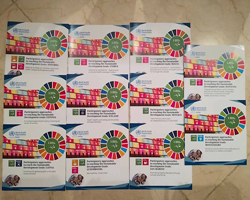Participatory approaches to reaching the Sustainable Development Goals: small countries’ voices have big impact

WHO
“Analyze, align, accelerate and advance” – 4 “As”, representing the key steps that countries need to take towards implementing the United Nations 2030 Agenda and achieving the Sustainable Development Goals (SDGs). Bettina Menne, Coordinator, Health and Development (SDG), WHO Regional Office for Europe, stressed the importance of these steps during the 6th high-level meeting of the small countries held in San Marino on 31 March – 2 April 2019.
Each “A” being important in itself, all 4 rely on input from all levels of government and society. This is clearly demonstrated in the recently launched briefings on “Participatory approaches to reaching the SDGs”, which document effective action taken by Member States participating in the WHO Small Countries Initiative to implement the United Nations 2030 Agenda. The briefings were coordinated by the WHO European Office for Investment for Health and Development in collaboration with the SDG Unit of the WHO Regional Office for Europe,
What approaches have the small countries taken so far?
Small countries have similar contexts (characteristics, size, etc.) and needs. Because of their populations’ shared sense of purpose, and as ideal settings for policy experimentation and innovation, it is easier for small countries to establish and implement policies quickly and effectively. The benefits of their small size can be maximized in implementing broad, multisectoral policies, such as “Health 2020: the European Policy for Health and Well-being” and the 2030 Agenda, which by their very nature require whole-of-government and whole-of-society approaches.
The SDG briefings reveal a myriad of areas in which the small countries are working, and just as many approaches. They also highlight key strategies and enabling mechanisms common to most of the countries, some of which are described below.
- High-level and, at times, even personal commitment to bringing about change and innovation, coupled with stakeholder involvement from an early stage, is key to getting initiatives off the ground.
- The health sector can take the lead in providing a straightforward and practical explanation of what is required to achieve the SDGs. It can help non-health sectors become advocates of doing so by illustrating how their “sector-specific” actions can make an impact.
- Multipartner and multisectoral cooperation is essential to ensure delivery of the many-faceted services. Including all relevant ministries and civil society in planning and designing services for a target audience enables meeting the needs of that audience in an interdisciplinary manner.
- A balanced input from all parts of the population and society is needed in the decision-making process to ensure that no one is left behind.
- The opinions of children and young people are valuable but often unheard. Involving this segment of the population is key to the goal of leaving no one behind. Establishing a youth council and a working group on health and education are just two of the ways in which the small countries are involving children and young people in achieving the SDGs.
- Surveys can reveal vulnerable groups and demographic change – data speak. Only by monitoring progress in improving health and well-being can countries know how they are really doing, and whether or not they are on track to reach the SDGs.
- International technical support and networks are a valuable support in many policy-adoption processes. The statements issued each year at the high-level meetings of the small countries show the value of coming together with the shared goal of putting in place policies necessary for reaching the SDGs.



